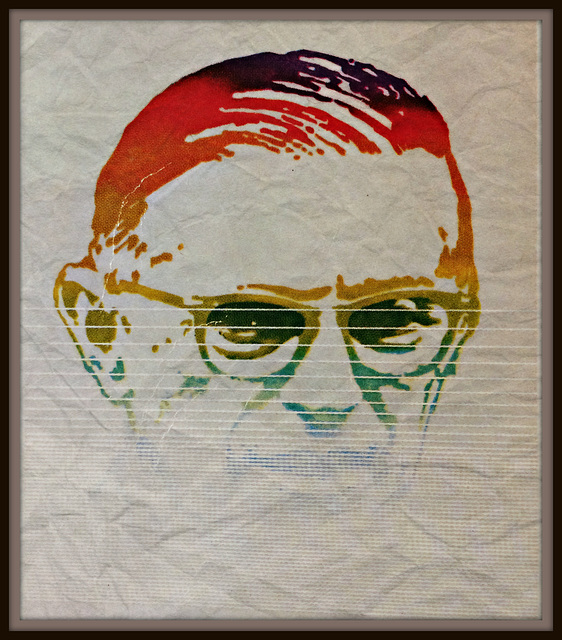Keywords
Authorizations, license
-
Visible by: Everyone -
Attribution + non Commercial
- Photo replaced on 03 May 2020
-
81 visits
Jean-Paul Sartre


“Man is condemned to be free; because once thrown into the world, he is responsible for everything he does. It is up to you to give [life] a meaning.”
wmpeople.wm.edu/asset/index/cvance/sartre
wmpeople.wm.edu/asset/index/cvance/sartre
Lebojo, buonacoppi, Jean have particularly liked this photo
- Keyboard shortcuts:
Jump to top
RSS feed- Latest comments - Subscribe to the comment feeds of this photo
- ipernity © 2007-2024
- Help & Contact
|
Club news
|
About ipernity
|
History |
ipernity Club & Prices |
Guide of good conduct
Donate | Group guidelines | Privacy policy | Terms of use | Statutes | In memoria -
Facebook
Twitter

In 1942 Sartre resigned his professorship to devote full time to writing. Asserting that a writer must refuse to allow himself to be classified as an institution, he rejected appointment to the French Legion d’Honneur in 1945, and rejected the Noble Prize for Literature in 1965. He was one of the major artists and writers in France to demand independence for Algeria, and in 1965 declined a lectur tour in the United States to protest of the American military role in Vietnam.
Excerpt from the last page of the Book “Being and Nothingness” of 1984 -- by Washington Square Press
Announcement
Address by Anders Österling, Member of the Swedish Academy
This year the Nobel Prize in Literature has been granted by the Swedish Academy to the French writer Jean-Paul Sartre for his work which, rich in ideas and filled with the spirit of freedom and the quest for truth, has exerted a far-reaching influence on our age.
It will be recalled that the laureate has made it known that he did not wish to accept the prize. The fact that he has declined this distinction does not in the least modify the validity of the award. Under the circumstances, however, the Academy can only state that the presentation of the prize cannot take place.
Refusal
In a public announcement, printed in Le Figaro of October 23, 1964, Mr. Sartre expressed his regret that his refusal of the prize had given rise to scandal, and wished it to be known that, unaware of the irrevocability of the Swedish Academy’s decisions, he had sought by letter to prevent their choice falling upon him. In this letter, he specified that his refusal was not meant to slight the Swedish Academy but was rather based on personal and objective reasons of his own.
As to personal reasons, Mr. Sartre pointed out that due to his conception of the writer’s task he had always declined official honours and thus his present act was not unprecedented. He had similarly refused membership in the Legion of Honour and had not desired to enter the Collège de France, and he would refuse the Lenin Prize if it were offered to him. He stated that a writer’s accepting such an honour would be to associate his personal commitments with the awarding institution, and that, above all, a writer should not allow himself to be turned into an institution.
Among his objective reasons, Mr. Sartre listed his belief that interchange between East and West must take place between men and between cultures without the intervention of institutions. Furthermore, since the conferment of past prizes did not, in his opinion, represent equally writers of all ideologies and nations, he felt that his acceptance might be undesirably and unjustly interpreted.
Mr. Sartre closed his remarks with a message of affection for the Swedish public.
At the banquet, S. Friberg, Rector of the Caroline Institute, made the following remarks: “Mr. Sartre found himself unable to accept this year’s Prize in Literature. There is always discussion about this prize, which every one considers himself capable of judging, or which he does not understand and consequently criticizes. But I believe that Nobel would have had a great understanding of this year’s choice. The betterment of the world is the dream of every generation, and this applies particularly to the true poet and scientist. This was Nobel’s dream. This is one measure of the scientist’s significance. And this is the source and strength of Sartre’s inspiration. As an author and philosopher, Sartre has been a central figure in postwar literary and intellectual discussion – admired, debated, criticized. His explosive production, in its entirety, has the impress of a message; it has been sustained by a profoundly serious endeavour to improve the reader, the world at large. The philosophy, which his writings have served, has been hailed by youth as a liberation. Sartre’s existentialism may be understood in the sense that the degree of happiness which an individual can hope to attain is governed by his willingness to take his stand in accordance with his ethos and to accept the consequences thereof; this is a more austere interpretation of a philosophy admirably expressed by Nobel’s contemporary, Ralph Waldo Emerson: ‘Nothing is at last sacred but the integrity of your own mind.'”
The quality of human life depends not only on external conditions but also on individual happiness. In our age of standardization and complex social systems, awareness of the meaning of life for the individual has perhaps not been lost, but it has certainly been dulled; and it is as urgent for us today as it was in Nobel’s time to uphold the ideals which were his.”
From Nobel Lectures, Literature 1901-1967, Editor Horst Frenz, Elsevier Publishing Company, Amsterdam, 1969
Sign-in to write a comment.